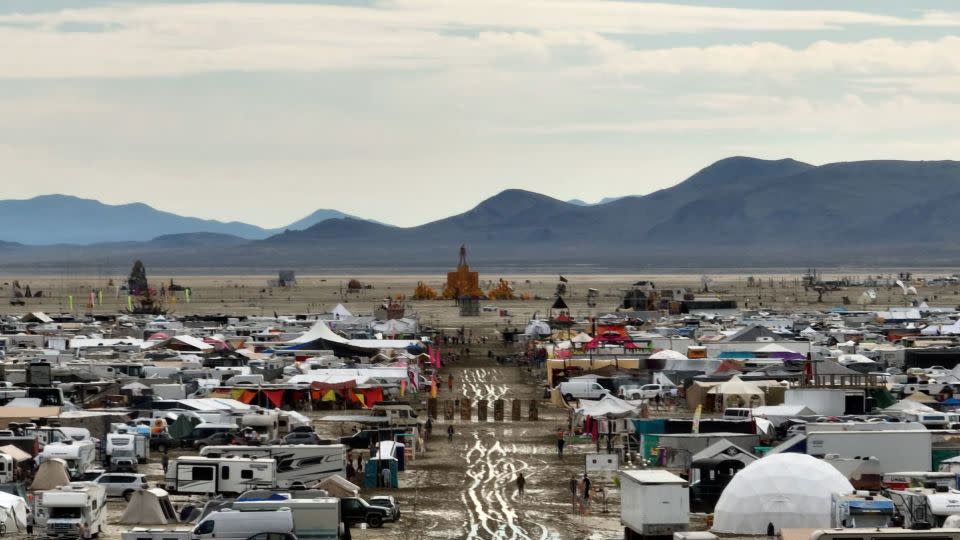From wood blocks to ‘poop buckets,’ how Burning Man organizers told festivalgoers to prepare for heavy rain
The first time Masha Maltsava attended Burning Man – the annual “ephemeral city” that attracts thousands of free-spirited revelers in the Nevada desert – she over packed.
“I prepared for maybe three months,” she recalled in an interview with CNN. “And I read all the packing lists, all the Reddit threads, all the WhatsApp chats, preparing for Burning Man last year.”
But this year – when heavy rain transformed the remote venue into a muddy mess that forced attendees to shelter in place and conserve precious resources – Maltsava wasn’t as prepared.
She became one of about 70,000 people stuck at the event when Black Rock Desert received over two months’ worth of rain in just 24 hours. The storms, which started Friday and continued through the weekend, turned the desert sand into a sloppy, slippery clay that made it impossible for drivers to enter or exit.
“I was overly prepared last year – but I think that’s the right way to do it,” she said.
While pictures of Burning Man’s elaborate art installations and people in intricate costumes might make the event look glamorous, the weekend’s severe weather has emphasized the challenges the experience poses. Attendees spend seven days in an isolated, harsh desert environment with limited access to outside resources and infrastructure.
And “self-reliance” is one of the event’s core principles, with organizers emphasizing participants are ultimately responsible for their own health and safety.
The event’s website advises attendees on how to prepare for the seven-day festivities – including in the case of extreme weather. Here’s how organizers suggest getting ready for the unique experience.

‘It’s one of the most strikingly beautiful and utterly ethereal locations in the world that will ever try to kill you’
The yearly celebration takes place in Nevada’s Black Rock Desert, a remote and isolated area where the roads become unreliable in difficult weather conditions. The closest settlement is Gerlach, a town of just over 100 people; Reno, the nearest city, is 93 miles away.
“The Black Rock Desert is a huge, flat, prehistoric lakebed, composed of a hardpan alkali, ringed by majestic mountains,” says Burning Man on its website. “Daytime temperatures routinely exceed 100°F, with extremely low humidity.”
Organizers are blunt about the location on the event’s website: “It’s one of the most strikingly beautiful and utterly ethereal locations in the world that will ever try to kill you.”
Burning Man advises attendees that “ultimately the responsibility for your personal health and safety falls to you,” part of the event’s “spirit of radical self-reliance.”
While the festival provides “essential safety infrastructure” including porta potties, ice for sale and on-site first responders, amenities are few and far between. Revelers are typically reliant on the gear they’ve brought themselves. Facilities for handwashing and showering are the responsibility of individual camps.
The festival suggests a long list of gear for each attendee, including food and beverages, an “extensive” first aid kit, warm clothing and fire extinguishers.
Additionally, “Burners,” what the event dubs attendees, should bring a “poop bucket,” especially in case rain makes porta potties inoperable. The website recommends a 5-gallon utility bucket with a lid and garbage bag liners.
And the list goes on: Attendees are urged to bring a portable shower, waterproof protective bags for any electronic gear, a battery- or solar-powered radio and warm clothing since temperatures can drop by as much as 50 degrees when the sun goes down.
In the case of rain, Burning Man emphasizes the importance of wood blocks to help keep generators and other electronic devices dry and electrical tape to seal off connections.
Nicole Gollub, who has attended four Burning Man events, said despite her prior experience and serious preparations, she still wasn’t ready for this year’s intense rain. “I don’t think anybody was really prepared for what we experienced,” said Gollub, who left the event during a pause in the downpour. “Typically, it rains, and it stops – but it just didn’t stop raining.”
Amid the difficult weather, the atmosphere was “peaceful” when she left, she said. “Everybody else was pretty calm and helping each other,” Gollub said. “I would have felt actually okay if we stayed, too, even though it would have been very uncomfortable.”
Like Maltsava, Gollub said preparing for the worst is a crucial part of the Burning Man experience. “You have to basically plan out the next seven days on your own in the desert,” she said. “It takes quite a bit of planning to get it right.”
And despite the organizers’ best efforts to prepare and warn attendees, “there’s always people that are not that prepared,” she said. And as the event has grown more popular, it has attracted participants who might not understand the “self-reliance” ethos.

“You get a lot of people that are just coming to party and they just think it’s like a big festival,” she said.
Still, Burning Man veterans are supportive of these newcomers, according to Gollub. “When people do need help, people are here with open arms trying to help each other,” she said.
Omar Sedky, another of this year’s attendees, likewise said more-prepared participants helped compensate for those in need.
“We’re overly prepared,” he said of his own group, who rented an RV for the event. “And we were also able to bring others in when the rain started.”
Participants who chose to camp in tents on the “playa,” the usually dry lake basin where the event is held, were in some of the worst positions when the rain started, he said.
Sedky said one of the main challenges at the site has been limited communication on the radio station, as well as vehicles getting stuck in the mud and creating traffic jams. He’s planning to drive a woman who is seven months pregnant out of the area in his RV, he said.
“One thing you’ll see a lot here is the sense of community,” he said. “So, if someone needs help, there’s plenty of people offering it.”
‘I almost had FOMO leaving’
While the photos of muddy campsites and flooded streets may look daunting, attendees said collaborating to survive a difficult environment is part of what Burning Man is all about.
Maltsava, who left the venue Saturday for a work engagement, recalled, “it was so beautiful to see people helping each other out and sharing supplies and batteries and power and water and food and shelter.”
She walked 10 miles to get out of the site, crossing knee-high waters in platform boots that slowly broke due to the thick mud. But still, she said, she “almost had FOMO leaving,” or “fear of missing out.”
Attendees were still partying and spending time together when she left, she said.
“To be honest, I wouldn’t change a thing,” she said. “I would still go, even if I knew it’d be such a mess.”
For Lubna Sharief, a six-time Burning Man attendee, the difficult camping conditions are part of what makes the event so special.
“The challenge and the survival skills and the preparation – this is a big part of it,” she said.
Sharief, who didn’t attend this year’s celebration, said that like Maltsava, she prepared extensively for her first Burning Man experience in 2011. Still, she said, she “didn’t really get it right.”
“You need help,” she said, emphasizing the crucial role that community plays in Burning Man. “We are all in the desert together, sharing what we brought together.”
Sharief said in previous years, she’d prepared for rain by bringing duct tape and trash bags to cover her boots if needed. “One of the good mantras to have is you can’t use it if you don’t bring it,” she said. “You can bring the extra canned food and you can bring the extra zip ties and rain supplies if it doesn’t rain and you know, kitty litter for a bucket toilet even if it doesn’t rain.”
The event’s emphasis on community balances its focus of self-reliance, she said.
“Reliance – bring everything you think you need,” Sharief said. “But also, if you have a problem, self-reliance is also going to find the person who can help you.”
For more CNN news and newsletters create an account at CNN.com

